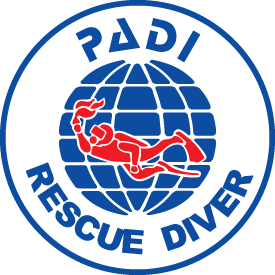General
*Note: Please book your accommodation prior to booking this course
Minimum Age:
12 / Divers under 15 may obtain a Junior Rescue Diver
Duration:
4-5 days with EFR
Prerequisites:
PADI Open Water Diver or qualifying certification from another training organization to participate in confined water only. PADI Advanced Open Water Diver or qualifying certification from another training organization to participate in rescue training sessions in open water. Complete a sanctioned course in CPR (such as EFR Primary Care) and basic first aid (such as EFR Secondary Care) within the past 24 months prior to Knowledge Development Presentation Two and Rescue Training Session Two.
Price : US$ 500
Description:
 Serious Fun! Learn to look after yourself and others! PADI’S Rescue Diver program will build your confidence as a diver, give you valuable experience in emergency management and prevention and heighten your awareness of the surrounding environment. Sections on self-rescue, diver stress, diving first aid, emergency management, equipment problems will prepare you to handle almost any emergency whether on the shoreline or in the water. The PADI Rescue Diver Course is widely accepted as one of the most challenging, rewarding and fun dive courses available!
Serious Fun! Learn to look after yourself and others! PADI’S Rescue Diver program will build your confidence as a diver, give you valuable experience in emergency management and prevention and heighten your awareness of the surrounding environment. Sections on self-rescue, diver stress, diving first aid, emergency management, equipment problems will prepare you to handle almost any emergency whether on the shoreline or in the water. The PADI Rescue Diver Course is widely accepted as one of the most challenging, rewarding and fun dive courses available!
The course is divided into three parts:
Knowledge Development: Five presentations
Rescue Training Exercise Sessions:
Self Rescue review
Who should take this course?
Scuba divers describe the PADI Rescue Diver course as the most challenging, yet most rewarding course they’ve ever taken. Why? Because you learn to prevent and manage problems in the water, and become more confident in your skills as a diver, knowing that you can help others if needed. During the course, you learn to become a better buddy by practicing problem solving skills until they become second nature. Plus, the course is just fun – it’s serious, but still allows for lots of laughter in between the focused learning.
PADI (Junior) Advanced Open Water Divers who are at least 12 years old and have completed the Underwater Navigation Adventure Dive may enroll in a Rescue Diver course. You also need to have Emergency First Response Primary and Secondary Care (CPR and First Aid) training within the past 24 months. You can complete this training during the Rescue Diver course. Your instructor may also offer the PADI Emergency Oxygen Provider specialty diver course at the same time.
What will you learn?
The PADI Rescue Diver course prepares you to deal with dive emergencies, minor and major, using a variety of techniques. Through knowledge development and rescue exercises, you learn what to look for and how to respond. During rescue scenarios, you put into practice your knowledge and skills. Topics include:
- Self rescue
- Recognizing and managing stress in other divers
- Emergency management and equipment
- Rescuing panicked divers
- Rescuing unresponsive divers
You may be able to get college credit for the Rescue Diver course – ask your instructor.
How can you start learning now?
Register for Rescue Diver Online – PADI’s eLearning option – to start now. You progress through five knowledge development sections using a web-based system that lets you learn at your own pace through an easy-to-use, interactive program. You also have access to an online version of the Rescue Diver Manual for reference during and after the course.
If you prefer, you can choose to study with the Rescue Diver Manual and watch the Rescue Diver Video (a book and DVD package). Go to your local PADI Dive Center and Resort to enroll in the course, get your materials and start learning. Your PADI Instructor will meet with you to schedule knowledge review sessions along with your rescue exercises and scenarios.
What scuba gear will you use?
You’ll use your basic scuba equipment and will need a pocket mask to practice in-water resuscitation. During exercises, you’ll work with an oxygen unit, floats, marker buoys and perhaps CPR mannequins. Your PADI Instructor will explain the equipment that you need and may suggest additional gear, such as your own first aid kit, which will be useful throughout your diving career.
Check with your local dive center to get advice about everything you need for your diving adventures.
